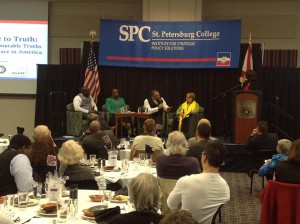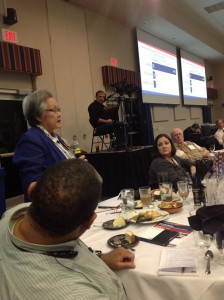
Race to Truth: Ten Immutable Truths about Race in America
SPC Programs & Events February 2, 2016“I don’t jog at night anymore.”
Thus began the introduction of Neil P. Phillips, founder of the Visible Men Academy of Bradenton and Presentator of the event ‘Race to Truth’. A well-spoken, tall, and immaculately dressed man of African American descent, he had a pleasant smile that invited smiles in return and a direct way of looking out at the audience that lent an open, friendly atmosphere to the room. Given the event was on race relations with an audience of mixed age and ethnicity, although predominantly Caucasian, the relaxing influence of his presence was impressive. Before the night was over, Mr. Phillips would make ten controversial points on race that he would address to everyone.
The event was hosted by the Institute for Strategic Policy Solutions at the Seminole Campus Conference Center on January 21, 2016. Moderating the event was Dr. Joyce Hamilton-Henry, Director of Advocacy of ACLU Florida. The panelists in attendance were Maria Scruggs, President of the St. Petersburg chapter of NAACP; Reverend Clarence Williams, Senior Pastor of the Greater Mt. Zion African Methodist Episcopal Church; and Irene Sullivan, retired Sixth Circuit Court Judge and author of the book, Raised by the Courts.
 The presentation began with Mr. Phillips detailing his own recent brush with racial profiling. He had been innocently jogging around his neighborhood at night when a white man standing out by the curb watching him approach suddenly turned and ran back inside his house. In an instant, Mr. Phillip’s pleasant night time jog became a full-on run. In genuine fear for his own safety–that the frightened neighbor was going for a gun or making a call to the police or, even worse, calling neighborhood security–Mr. Phillips ran all the way home.
The presentation began with Mr. Phillips detailing his own recent brush with racial profiling. He had been innocently jogging around his neighborhood at night when a white man standing out by the curb watching him approach suddenly turned and ran back inside his house. In an instant, Mr. Phillip’s pleasant night time jog became a full-on run. In genuine fear for his own safety–that the frightened neighbor was going for a gun or making a call to the police or, even worse, calling neighborhood security–Mr. Phillips ran all the way home.
Living in a mixed community in today’s explosive atmosphere, Neil Phillips now feels he doesn’t have the freedom to jog at night like his white neighbors. To make his point, Mr. Phillip’s applied “What If” scenarios from recent fatalities involving race profiling to his own experience that night. Suddenly, what seemed implausible—that a family man could be killed by a neighbor or responding officer for simply being a black man taking a night time jog in his own neighborhood–became uncomfortably realistic to the audience. It wasn’t far-fetched. Precedents were there, and as he pointed out about all the ‘regrettable’ fatalities stemming from instances of race profiling, “I insert an image of a white man or white boy in these situations, and I can’t shake the image that it just ends differently.”
“How has our world changed, since Trayvon Marten lost his life? What have we learned from it?” Phillips then brings up other names and recent events where what started out as racial profiling and discrimination cascaded, leading to death and even riots. “We need to break through, we have to get to a different place of being, somehow, someway.”
Ironically, he then pointed out the paradox of all the current race debate today; it’s so much noise. “Then there is all this talk about the conversation… constantly talking about the conversation… as if dialog and discourse is the goal. That’s not the goal. What’s the conversation supposed to be about? White people are supposed to continually declare they’re not racist? Are black people supposed to continually declare our lives matter? That’s insulting for both. And how long does the conversation have to be? Where is the action, where is the breakthrough to a new place of being?”
As a son and a father, Mr. Phillips was very forthcoming about his family’s blessings. “My black man tank is pretty full. I grew up in a middle class home, had two wonderfully loving and supportive parents that created opportunities for me to go to wonderful schools, which led to wonderful opportunities to travel and gain great professional opportunities. And most of all about having a full black man tank? I know a lot, I mean a lot, of white people.”
He then went on to confess, “I got to tell you that I am a reluctant, and even resistant, expert on race; I actually don’t believe there can be such a thing. But what I am an expert on, is my relationship with race. I am the foremost expert on that. But race and race relationships and how we experience them are all such personal things that I don’t believe any of us can be an expert for another.”
Mr. Phillips quoted the first paragraph of the Constitution and pointed out that when it was written, it was in fact untrue. The founding fathers could not have truly believed ‘All Men’ were created equal and still supported slavery. Humorously, he pointed out to the room how that one moment in history clearly defined the sheer importance of having a diversity committee; had there been a black man or woman present, they would have pointed out to the founding fathers they couldn’t write that.
Then he gave his Ten Immutable Truths:
· America’s existence is tied to an un-truth.
· Black people can’t “just move on”.
· Black people have to stop blaming outside forces for their problems.
· Politics undermine progress on race relations in America.
· Issues of poverty are often mistaken for issues of race.
· The concept of “Blackness” is limiting.
· Personal responsibility and self-sufficiency require education.
· Black people need to be as committed to mobilizing against intra-race transgressions as inter-race transgressions.
· All men are not valued equally.
· The path to a new place of Being is paved with dignity, inspiration, and love.
 None of the audience seemed to dispute him, although there was some discord from the panelists, but not much. Ms. Scruggs seemed the most receptive of his ten truths, but asked who held the public administrators accountable for discrimination? She felt that was where the first steps needed to be taken in addressing these issues and pointed out that Pinellas county has five of Florida’s 13 failure factory schools, all of which are in predominantly black neighborhoods. She also pointed out that “the one thing we have control over is the institutions, that we pay for through our taxes.”
None of the audience seemed to dispute him, although there was some discord from the panelists, but not much. Ms. Scruggs seemed the most receptive of his ten truths, but asked who held the public administrators accountable for discrimination? She felt that was where the first steps needed to be taken in addressing these issues and pointed out that Pinellas county has five of Florida’s 13 failure factory schools, all of which are in predominantly black neighborhoods. She also pointed out that “the one thing we have control over is the institutions, that we pay for through our taxes.”
While Reverend Clarence Williams enjoyed the presentation, it was clear he did not agree with the process used in getting to the third truth, of ‘stop blaming outside forces.’ While he admitted he would have that exact same conversation with his son, “The question for me,” declared the Reverend, “isn’t whether I can overcome or not, or whether I should build the self-fortitude to be able to overcome. The question is, why should I have to?”
The Reverend ended his overall analysis with, “The real problem brother, is money. And I don’t mean to suggest your presentation has been sanitized; I think it was a great, touchy, feely, don’t hurt nobody presentation. But race—a word by the way that has no scientific definition, the word was created to formulate a basis by which one group of people can be treated differently then another, and the reason for that is money—race is profitable in America.”
As a retired judge, Irene Sullivan, the only Caucasian on the panel, took a different viewpoint. She thanked the others for her being there. While she did not take a stance on the ten truths, she felt this was a very necessary and urgent kind of conversation and was reminded of Martin Luther King’s The Fierce Urgency of Now.
“I’m going to direct my comments to children because I was a juvenile judge for nine years before I retired, and my territory was St. Petersburg,” informed Ms. Sullivan. “I was so naïve when I went into the position, that when I first saw a sea of black faces in my juvenile court, maybe 60, 70% black faces, when I think the demographics were 17% African Americans in St. Pete… and I… I was just shocked. I couldn’t understand it. So often those children were charged, very young, 8 years old, 9 years old, for very silly misdemeanors and infractions, but were brought in.”
Ms. Sullivan then goes on to state that she and the other judges began to study the situation. They followed some of the children’s records. They learned there were programs out there like Academy Prep with scholarships for black children from those same neighborhoods, and none of those kids ever were in their court room. “They were busy all day, they had three meals, they had sports, they had mentors, and 90% went on to college. 100% graduated from high school. So that made me feel worse because I knew there were programs out there to keep these kids busy and off the streets and not committing crimes.”
She went on to talk about other programs that had helped the children in South St. Pete. Programs involving interaction with firemen and police officers, and then those kids involved never came back to the court room. “So I guess what I’m trying to say today, is that what frustrates me even more, is not the percentage that are there, not the segregated area that they live in and the poverty, but the fact that we know what works for kids and we don’t seem to be able to fix it. All of them deserve it, and not just a few. I hope to keep working on this.”
Ms. Sullivan also addressed the issue of heavy police presence in poverty stricken, segregated areas. “We have to start educating the police—and I have so much respect for the police all over Pinellas county—we have to educate them that they can’t keep finding kids doing silly little things that kids do… and getting arrested and brought in to court, because of the heavy police presence in that community.” Ms. Sullivan than quoted Dr. Kanika Tomalin, Vice Mayor of St. Petersburg. “If you fish in a trout pond, you’ll catch trout.”
Questions and statements from the audience ranged from direct to theoretical to seeking to implement a process. Adrian West, Seminole SGA President, asked, “What is the solution? Not five solutions, six solutions, give us one viable solution. Education’s not working. Politics isn’t working. Religion isn’t working. All of our opinions isn’t working. So give us the solution to the problem.”
African American Public Policy student Kevin James, honoring a quote from the movie the Tuskegee Airmen, had this to say, “After we look at each and every incident, from Ferguson, New York, Sanford, Trayvon Marten, Michael Brown, Sandra Bland, names and places on and on. Am I merely to be an American–as a person who served this nation with honor and dignity and courage–am I merely to be an American when the mood suits you?”
 Other suggestions were fired from the audience. A mathematics student hypothesized that perhaps there was a mathematical way of clearing up the ambiguity in the issues. A retired Doctor who had immigrated here from Japan decades before wondered why she had to be referred to as Asian American. Why she couldn’t just be American?
Other suggestions were fired from the audience. A mathematics student hypothesized that perhaps there was a mathematical way of clearing up the ambiguity in the issues. A retired Doctor who had immigrated here from Japan decades before wondered why she had to be referred to as Asian American. Why she couldn’t just be American?
At the end, I managed to get in the last two questions. My first concerned the Constitution; why did we need amendments to extend human rights? Wouldn’t it just be simpler to legally redefine the term ‘All Men’ to mean ‘Human Kind’? Congress redefines words all the time. If we did that, then all races and even women would be protected by the Constitution.
No one had much input on this, although Reverend Williams truly wished me good luck, but he felt this was a practice which needed to be addressed within men’s hearts.
My second question revolved around the fact that since 2008, Special Forces and military tactics used in the streets of Iraq to fight insurgents and guerilla warfare, had been incorporated into our police forces. Had anyone on the panel done any research on what impact this was having in the communities? The split-second reactions from the police that were leading to deaths?
Reverend Williams was very defensive of the police force overall, pointing out what they faced with the guns on the streets and policies, he thought were endangering their lives. Then he concluded “we need to root out the 1% rogue cops, that are criminals with badges.” While his loyalty to law enforcement was admirable, he didn’t address the incorporation of military tactics.
For this Ms. Scruggs had an opinion. “Having been previously certified in three law enforcement academies, one of the things I’ve been very vocal on are the military tactics that are being deployed in the African American community. To come out of my house and see a Humvee parked down the street? I about lost it with the Chief, and thought–have we absolutely lost our minds?”
At the end of the debate, I was reminded of two quotes given by Neil Phillips during his presentation:
“There is something about race relations. It’s messy. It’s complex. It’s convoluted.”
“We have to find a way to allow the power of love to work its magic. Enable us to humanize one another. To listen to one another. To care about one another. At the heart of this is love.”






